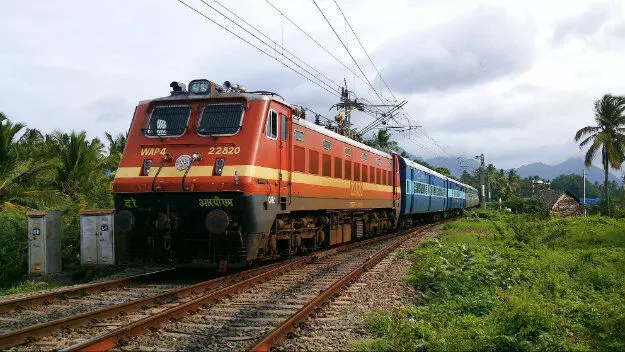Train travel becomes safer; RPF embarks on digital mission to redefine security
RPF has fast-tracked digital transformation to shift from traditional reactive measures to forward-thinking, technology-driven strategies
By Sistla Dakshina Murthy
Representational Image
Hyderabad: Technology has come in handy for the Railway Protection Force (RPF) to redefine safety and security.
RPF has fast-tracked digital transformation to shift from traditional reactive measures to forward-thinking, technology-driven strategies.
With initiatives that combine cutting-edge technology with practical applications, the RPF is setting benchmarks in modern law enforcement, according to an RPF Tech Group article titled ‘Digital Transformation in Railway Protection Force - Adapting to the Evolving Security Landscape’.
Digital Transformation: Technologies Revolutionizing Railway Security
Artificial Intelligence (AI) and Big Data Analytics
AI is a game-changer. Imagine a system that flags high-risk zones before an incident occurs or detects anomalies in passenger behavior. AI tools have the potential to prevent stampedes at crowded stations by monitoring crowd density and enabling pre-emptive interventions.
Access Control-based Tech Initiative:
Queue management System:
Seamless and Secure RPF has utilised Biometric-based seamless coach entry systems which have redefined access control. This system eliminates fraud while making passenger movement smoother and more secure.
CCTV Surveillance: Eyes Everywhere
High-definition cameras equipped with facial recognition technology identify and track suspects in real time. For instance, Western Railway’s pilot project of AI-powered FRS-enabled surveillance systems over certain sections of the sub-urban network has improved crime detection rates, setting a benchmark for other stations.
Electronic Seals: Ensuring Freight Security
The RPF’s e-seal pilot project is an attempt to revolutionize freight security across Indian Railways through appropriate tech intervention. These GPS-enabled electronic seals monitor the status of cargo in real-time, providing location data and ensuring tamper-proof operations.
The seals have the potential to significantly reduce incidents of theft and tampering with booked consignments, particularly in high-risk areas. These devices reflect appropriate technology theory, emphasizing scalable and cost-effective solutions for complex logistical challenges.
Mobile Apps: Empowering Passengers
Passenger-centric apps like Rail Madad and Meri Saheli have redefined public security. A recent case in November 2024 highlights how a distress call via Rail Madad helped recover luggage by the RPF within fifteen minutes - an example of technology translating into tangible benefits.
The Meri Saheli initiative of the RPF focuses on the safety and empowerment of women passengers. Using a combination of mobile applications and on-ground RPF teams, the program ensures a personalized secure travel experience, from boarding point to destination.
The data of the vulnerable passengers are generated to the field units for pinpointed coverage and ensuring safe journeys of women passengers across India. RPF Meri Saheli team personnel (often female personnel) are assigned to interact with women passengers en route, particularly those traveling alone, to understand their concerns and gather travel details.
Sangyaan (A Legal Repository App) –
Developing an afuture-readyy Force through anywhere anytime learning initiative. The Sangyaan app, developed in-house by the RPF’s Technology Team, is a game-changer for law enforcement.
This app serves as a comprehensive repository of India’s three new criminal laws namely the Bhartiya Nyaya Sanhita (BNS), Bhartiya Nagarik Suraksha Sanhita (BNSS), and the Bharatiya Sakshya Adhiniyam (BSA).
It provides officers with instant access to new changes in investigative procedures, including changes in sections, penalties, and case precedents.
Cyber Cells: Proactive Policing through Advanced Analytics
The RPF has established dedicated cyber cells across zonal headquarters, ushering in a new era of technology-driven policing. Armed with sophisticated tools for digital forensics, cyber patrolling, and real-time data analytics, these units focus on preemptively addressing threats to railway security.
RPF cyber cells utilize advanced social media intelligence (SOCMINT) and open-source intelligence (OSINT) techniques to identify potential crime hotspots.
PRABAL: Harnessing the Power of Big Data
PRABAL is the cornerstone of RPF's big data analytics strategy. It analyses extensive data streams from ticketing websites, and passenger movements which are utilized along with actionable intel inputs generated from social media platforms to identify anomalies indicative of criminal activities.
PRABAL has been instrumental in:
• Busting large-scale ticket touting networks, including the notorious international syndicate, leading to the seizure of Rs 150 crores worth of assets.
• Generating actionable intelligence that has led to the rescue of trafficking victims.
• Identifying patterns that assist in combating smuggling and theft over Indian Railways, ensuring the protection of railway revenue and passenger trust.
Real-World Successes: Technology-Driven Impact
The RPF’s Operation Nanhe Farishtey has utilized advanced data analytics and real-time digital surveillance to rescue over 84,000 children since its inception. In 2024 alone, the initiative saved 14,756 children from trafficking and exploitation.
RPF is already piloting the integration of facial recognition systems with the CCTV surveillance system. These tools ensure seamless detection of potential victims by analyzing travel patterns.
The Bengaluru pilot project - AI-driven facial recognition systems - has revolutionized offender identification. This technology has already led to the identification and arrest of dozens of individuals involved in crimes such as theft, vandalism, and human trafficking.
The success of this pilot underscores the potential of scaling facial recognition technology for other high-traffic railway stations nationwide. The RPF’s cyber cells have employed cutting-edge tools such as network analysis and digital forensics to dismantle organized crime syndicates operating in the railway ecosystem.
The RPF said it was looking at integration of internet of things (IoT), advanced AI, and personalised security by 2030 to create a smart and secure rail network.
These interventions have successfully neutralized major ticket-touting networks, recovering substantial revenues for Indian Railways.